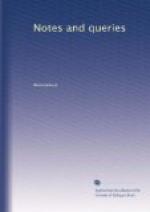GEORGE STEPHENS.
Stockholm.
[Even our respect for Mr.
Stephens’ well-known scholarship, fails to
remove our prejudices in favour
of the ordinary system of orthography.]
On a Passage in “The Tempest" (Vol. ii., pp. 259. 299. 337.).—Will you allow me to suggest that the reading of the original edition is perfectly correct as it stands, as will be seen by simply italicising the emphatic words:—
“Most busie least, when I doe it.”
The construction is thus merely an instance of a common ellipsis (here of the word busy), and requires the comma after least. This is another proof of the advantage of being slow to abandon primitive texts.
GEORGE STEPHENS.
Saint, Legend of a (Vol. ii., pp. 267.).—The circumstance alluded to is perhaps that in the legend of St. Patrick. It was included by Voragine in his life of that saint. See the “Golden Legend” in init.
GEORGE STEPHENS.
Cupid and Psyche (Vol. ii., pp. 247.).—This is probably an old Folk-tale, originally perhaps an antique philosophical temple-allegory. Apuleius appears only to have dressed it up in a new shape. The tale is still current, but in a form not derived from him, among the Swedes, Norwegians, Danes, Scots, Germans, French, Wallachians, Italians, and Hindoos. See Svenska Folk-sagor och Afventyr, efter muntlig Ofverlemning samlade och utgifna of G.O.H. Cavallius och G. Stephens, vol. i. (Stockholm, 1844-9), p. 323.
GEORGE STEPHENS.
Kongs Skuggsia (Vol. ii., pp 296. 335.).—This noble monument of Old Norse literature was written at the close of the twelfth century by a Norwegian of high rank, but who expresses his resolution to remain unknown, in which he has perfectly succeeded. He probably resided near Trondhjem. See, for other information, the preface to the last excellent edition lately published by Keyser, Munch, and Unger, as follows:—
“Speculum Regale Konungs-Skuggsja Konge-Speilet et philosophisk-didaktisk Skrift, forfattet i Norge mod slutningen af det tolfte aarhundrede. Tilligemed et samtidigt Skrift om den norske kirkes Stilling til Statem. Med to lithographerede Blade Facsimile-Aftryck.”—Christiana, 1848. 8vo.
GEORGE STEPHENS.
Stockholm.
The disputed Passage in the “Tempest" (Vol. ii., pp. 259. 299. 337.).—I am the “COMMA” which MR. COLLIER claims the merit of having removed, and I humbly protest against the removal. I adhere to the reading of the folio of 1632, except that I would strike out the final s in labours. The passage would then read:
“But these sweet thoughts so refresh
my labour
Most busy least, when I do it.”
That is, the thoughts so refresh my labour, that I am “most busy least” (an emphatic way of saying least busy), “when I do it,” to wit, the labour. MR. HICKSON is ingenious, but he takes no notice of—




